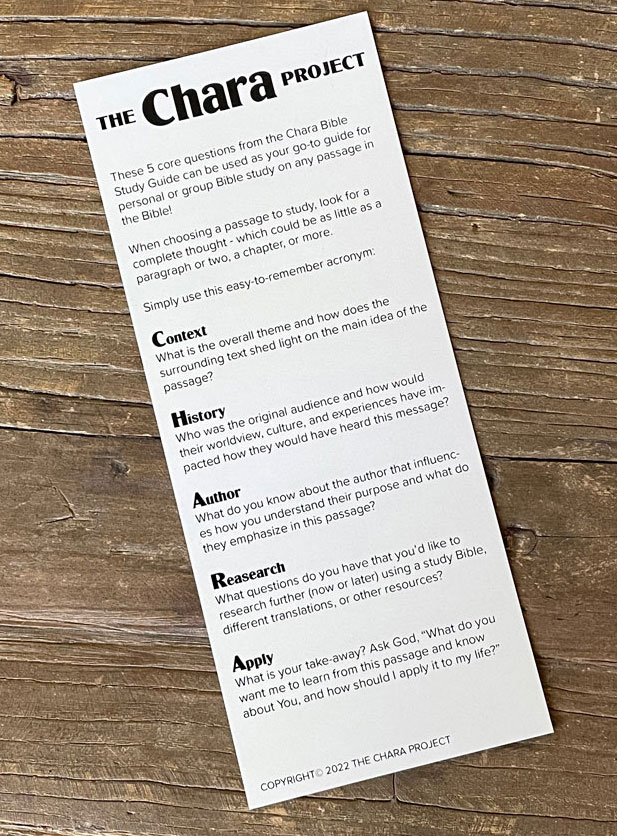“But he said to me, “My grace is sufficient for you, for my power is made perfect in weakness.” Therefore I will boast all the more gladly about my weaknesses, so that Christ’s power may rest on me.” (NIV)
Welcome to the Bible Study Guide for 2 Corinthians 12:9, which leverages questions from the CHARA Bible Study Guide when studying this verse. Below are the questions the Chara team chose to ask, in the order they chose to ask them, but feel free to use other questions or change up the order as you dive into this passage. For ANSWERS from the Chara team on these questions, check out the video below.
AUTHOR/HISTORY
Person: Who was the author of 2 Corinthians? Who was it written to? (Hint: You can find this information in the intro to the book of 2 Corinthians in a Study Bible, or in 2 Corinthians 1:1)
CONTEXT
Immediate: What is the theme or main idea found in the surrounding paragraph(s)? (Hint: Start by reading 2 Corinthians 12:1-10, then expand out to read 2 Corinthians 10-11). How does reading the Context help determine what the verse means?
AUTHOR
Purpose/Point: What was the author’s purpose, why was it written? (Hint: We can typically learn an author’s purpose from the intro to the book in a Study Bible and/or by reading the entire book. You can also get some insight to Paul’s purposes from verses like 2 Corinthians 2:4, 11:1-4, 11:9-15, 11:21-30, 13:2-3). Paul clearly loves the church of Corinth, wants to warn them against false teachers and build back his own credibility with the church by boasting in his weaknesses.) What insight does it provide into understanding 2 Corinthians 12:9?
Patterns: What is highlighted through Paul’s use of repetition in 2 Corinthians 11:23-30? How does this help our understanding of 2 Corinthians 12:9? How do we see Paul speaking from experience of hardship and weakness?
Person: How did Paul’s experiences influence what he communicated? (Hint: read 2 Corinthians 6:3-10 and reread 2 Corinthians 11:21-30 to see how Paul describes his circumstances).
RESEARCH
Original Language: What does “perfect” mean in the original Greek language? (Hint: use Blueletterbible.org, Logos, or Biblehub.com to find out it means “made completed,” “finished,” or “accomplished”). How does that help you understand 2 Corinthians 12:9 more clearly?
Translations: Does another Bible translation (or version) add perspective or clarity on what the original language was trying to communicate in 2 Corinthians 12:9? (Hint: check out the Amplified Bible or New Living Translation using the YouVersion Bible App)
Resources: What insights do you learn from Biblical scholars provided in Study Bibles, commentaries, and credible online resources?
CONTEXT
Bible: Does my interpretation hold true throughout the rest of the Bible? (Hint: Check out cross references tied to 2 Corinthians 12:9, or concordance references around “weakness,” “power,” “strength,” “boast,” etc, which may lead you to verses like 1 Peter 4:11 or Jeremiah 9:23-24.) Can you find any example stories of people in the Bible where God’s strength is revealed through the weakness of someone?
APPLY
Respond: What was expected of the original audience and what principles make sense for us now (is it a cultural or timeless truth)? What timeless principles have you learned by studying 2 Corinthians 12:9?
Pray: “Lord, what do you want me to learn and how should I apply this to my life?”
Reflect: What specific questions do you have upon further reflection of the passage? Is there a verse that you’d like to memorize to speak truth to your heart and mind? (Consider memorizing 2 Corinthians 2:9-10, or other verses you ran across during your study)


